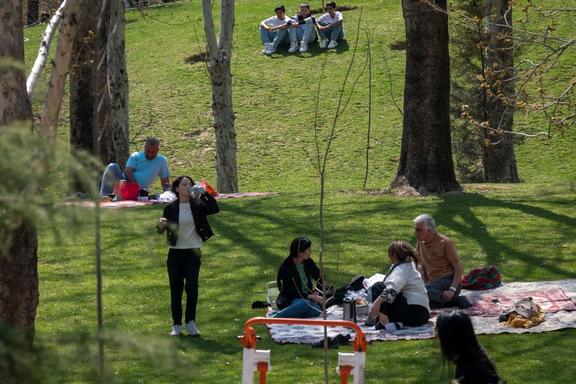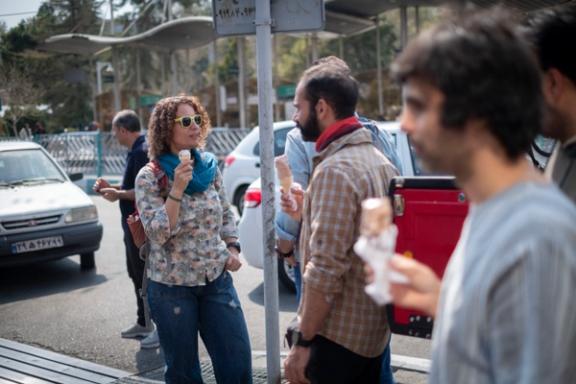Iranians Defy Regime’s Clampdown On Annual Spring Picnic Tradition

The regime’s multiple efforts to stop the public from celebrating the ancient Spring Picnic Day (Sizdah Be-dar) on Monday, were met with defiance by many Iranians.
The Iranian authorities’ actions come as the Islamic month of Ramadan and the death anniversary of the first Imam coincided with the Persian New Year celebration of Sizdah Be-dar.
After contradictory statements from the government ahead of the holiday, authorities blocked access to parks and roads to recreational spots around rivers and lakes and forests, using concrete blocks and heaps of earth – common picnic locations where Iranians usually gather on this day.
In some places police also actively interfered with those who had ventured out to picnic despite the warnings and even clashed with them. A video posted on social media shows the police using tear gas to disperse the picnickers in Masouleh. Infuriated Iranians in the touristic town in northern Iran eventually drove them out by booing and shouting “scoundrels” at them.
Police are booed after firing tear gas at picnickers in Masouleh.
⭕️مزدوران سرکوبگر انتظامی با گاز اشک آور به مردم ماسوله حمله کردند و میخواستند مانع برگزاری #سیزده_بدر آنها بشوند مردم با شعار بی شرف بی شرف آنها را فراری دادند .دم شون گرم
— Simorgh News | سیمرغ نیوز (@Simorgh_News) April 1, 2024
دوشنبه ۱۳ فردوردین ۱۴۰۳#IRGCterrorists … pic.twitter.com/eygHbkL8S1
Although the Sizdah Be-dar picnic is traditionally celebrated during daytime, Iranians in some areas waited until the evening to get out, as authorities had announced that parks and public gardens would be open after iftar – the evening time of breaking the fast.

At Tehran’s Gheytarieh Park the police assaulted street musicians who were playing music and took them away while angry people booed them.
Police forcefully remove street musicians from Gheytarieh Park in Tehran.
پارک #قیطریه تهران ، سیزده فروردین ، همیشه این پارک نوازنده ها میان و ساز میزنن اما روز سیزده بدر امسال هرکس که ساز میزدن رو زیر بار کتک میگرفتن رو میبردن#مهسا_امينی pic.twitter.com/WDYZm7cAhu
— Shahinlooo (@Shahinlooo) April 1, 2024
In many areas the Basij paramilitary and vigilantes patrolled the picnic spots in vehicles, playing loud mourning songs on megaphones to intimidate and threaten the picnickers to leave the area. A video posted on social media shows them threatening picnickers at a beach in Langaroud in northern Iran with one of them shouting “This is the city of Imam Hussain, pick up your stuff and leave” into a megaphone.
Paramilitary Basijis threatening picnickers in Langaroud in northern Iran
رژه خودروهای پایگاههای بسیج و سپاه در روز سیزده بدر در ساحل لنگرود
— Pouyan Khoshhal (@pkhwshhal) April 1, 2024
ویدیویی به دستم رسیده که نشان میدهد دهها خودرو با آویختن پرچمهای مذهبی و با استفاده از چندین بلندگو، برای مسافران و شهروندانی که به مناسبت سیزده بدر ۱۴۰۳ در محدوده ساحل چمخاله حضور داشتند، مزاحمت ایجاد کردند.… pic.twitter.com/u2erJ1qOTN
The 13th and final day of the Persian New Years holidays is called Sizdah Be-dar and is always celebrated with a picnic. Sizdah Be-dar is often thought to mean “casting off [the inauspiciousness] of thirteen]” but can also mean “spending the thirteenth in the valleys”.
Video sent to Iran International shows a police car blocking the road to a picnic spot.
یکی از مخاطبان ایران اینترنشنال با ارسال ویدیویی از ساری در روز ۱۳ فروردین گفت که نیروی انتظامی از ورود شهروندان به طبیعت برای مراسم سیزده بهدر جلوگیری میکند pic.twitter.com/4Y9lPxH9hJ
— ايران اينترنشنال (@IranIntl) April 1, 2024
Since the Islamic Revolution of 1979, the regime has reluctantly tolerated the country’s ancient New Year (Norouz) festival which is celebrated on the day of the Spring Equinox. But the religious establishment has been against the celebration of others such as Charshanbeh Souri bonfire night on the last Tuesday of the old year and Sizdah Be-dar. Authorities, accordingly, have often tried to prevent these festivities, both of which are celebrated outdoors joyfully by Iranians.
Islamists play loud mourning songs on a road in the northern province of Gilan.
در گیلان هر جایی که دستشون میرسید رو بستن، مردم اما توی طبیعت بودن، اینجور کاروان راه انداختن و خزعبل میگفتن، رسما مقابل مردم لشگرکشی کردن!
— TavaanaTech تواناتک (@TavaanaTech) April 1, 2024
(کانال مملکته)#سیزده_بدر pic.twitter.com/nHLvs54s7a
To the regime, Chaharshanbeh Suri is viewed as a pagan relic because of its association with fire and Sizdah Be-dar, which was renamed as Nature Day after the Islamic Revolution of 1979, promotes superstition.
Be that as it may, the celebration of Sizdah Be-dar is so popular that it has remained a public holiday in the official calendar as most Iranians, even many religious families, have not forsaken their beloved ancient and pre-Islamic festivals and continue to celebrate them, sometimes even alongside religious occasions.